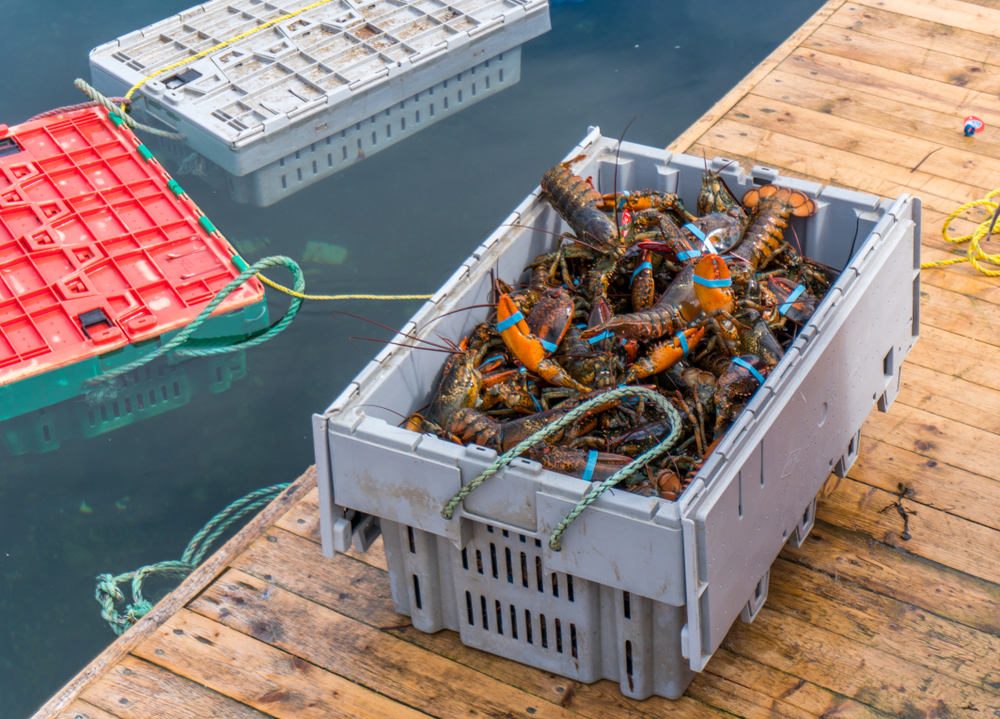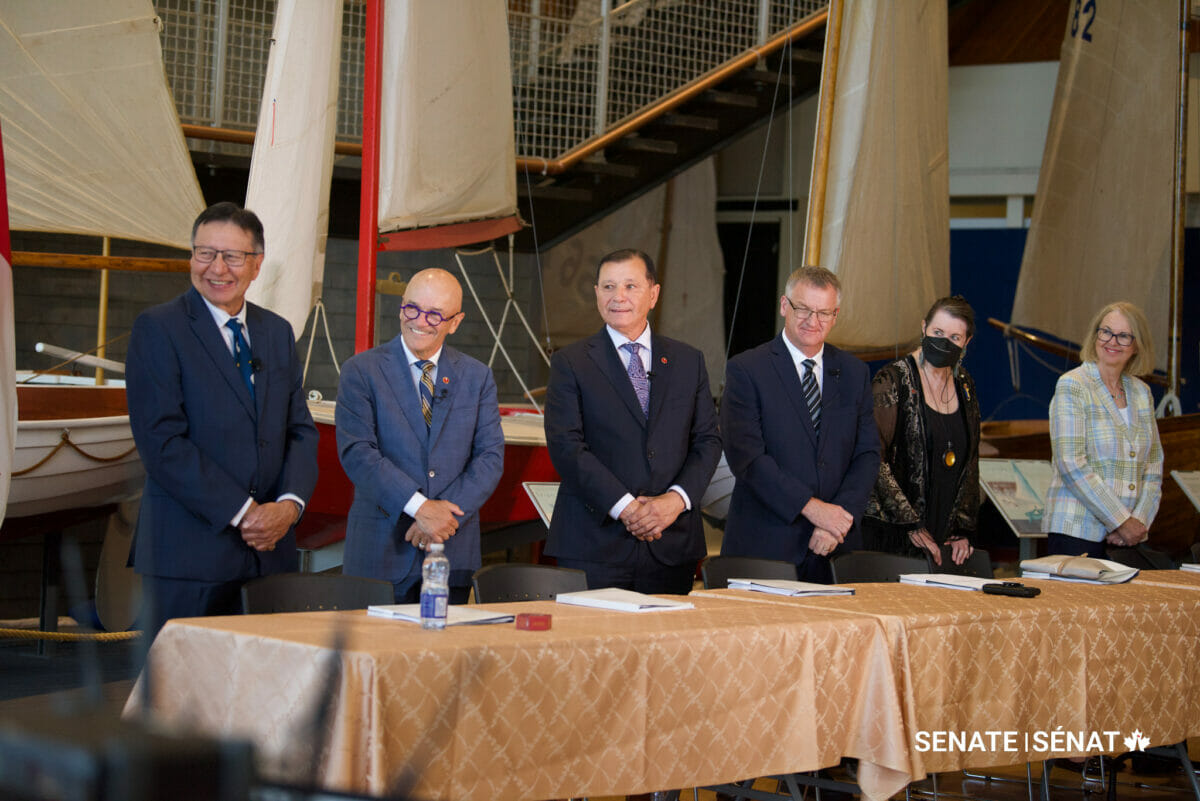New Report Shows Canadian Government Has Failed Indigenous Fishers
A senate report details instances of racism and discrimination against Indigenous lobster fishermen, sometimes at the hands of government agents.
New Report Shows Canadian Government Has Failed Indigenous Fishers
A senate report details instances of racism and discrimination against Indigenous lobster fishermen, sometimes at the hands of government agents.

A crate of fresh lobsters being unloaded in Newfoundland, Canada.by Mary Anne Love, Shutterstock.
The Standing Senate Committee on Fisheries and Oceans had harsh words for the Canadian federal government. At a meeting this week in Halifax, Nova Scotia, the committee presented its new report, which looked at the implementation of Indigenous rights-based fisheries. Its findings suggest that, despite more than two decades since key precedents were set, the fisheries have not been fully implemented. This has led, the committee stated, to confusion, tension and violence.
In Canada’s Atlantic provinces (Nova Scotia, New Brunswick, Prince Edward Island and Newfoundland and Labrador), as well as parts of Quebec, 35 First Nations have a treaty right to fish for a moderate livelihood. That means these Indigenous groups can fish in the coastal waters without a commercial license. Some First Nations have also fished outside of commercial fishing seasons. That right was upheld by the 1999 Marshall decision, a key case in the Canadian Supreme Court.
However, in the 23 years since the Marshall verdict, the senate committee has found that the standards for moderate-livelihood fisheries have not been fully implemented. That has led to tension between Indigenous and non-Indigenous fishers, which has occasionally boiled over into outright violence.
The senate committee, throughout its report, detailed the ways in which systemic racism has plagued government entities, including members of Fisheries and Oceans Canada (DFO), along with members of the Royal Canadian Mounted Police (RCMP). “We have testimony from witnesses that law enforcement and regulators have failed to abate the violence and destruction. This is all extremely troubling and a direct result of the federal government’s failure to implement treaty rights for First Nations fisheries,” says Sen. Fabian Manning, chairman of the committee.
To move forward, the group has put together 10 recommendations for the federal government to follow. They range from removing DFO as the overseer of the treaty fisheries to increasing education on treaty rights for all fishers.

Perhaps the most contentious recommendation is to do away with the “buy-back” system of licenses in favor of a reallocation system. Under the current system, the federal government can buy commercial fishing licenses and redistribute them to Indigenous fishers. It does this in an effort to maintain a sustainable level of fish caught, season to season, rather than create new licenses for treaty fishers. However, the senators noted that this current system simply isn’t working as intended. Moreover, some find it insulting in the face of their treaty rights. “I find it very weird that our constitutionally treaty-based rights are subject to buy back approaches,” says Sen. Dan Christmas, a committee member as well as a member of the Membertou First Nation. “If licenses aren’t available, then Mi’kmaq people do not fish, even though we have Marshall, even though we have constitutionally protected rights. So, it seems our rights are at the whim of the sale by non-Indigenous fishers…I find that very, very disturbing.”
Instead of the buy-back system, the committee proposes a reallocation, wherein a portion of the quota from commercial licenses will be pulled together to create new licenses. Although the committee said it did not have a specific amount in mind to be reallocated from existing licenses, it stressed that it should be a very small amount. Even so, Senator Brian Francis acknowledged it might be a hard change for commercial fishers. “This recommendation may be controversial for some, but rights are rights. The exercising of these rights cannot continue to be contingent on the federal government’s ability to buy back licenses,” he says.
These recommendations are not binding, and the federal government can choose how it wishes to address them; the government has 150 days to respond to the report. However, committee members are confident their findings will be followed, because they say the alternative is unsustainable. “The status quo isn’t working. Everyone’s frustrated,” says Christmas. “Every once in a while, those frustrations bubble over and something happens. So, what we were aiming for in this report was trying to find a path to peace.”
Follow us

This work is licensed under a Creative Commons Attribution-NoDerivatives 4.0 International License.
Want to republish a Modern Farmer story?
We are happy for Modern Farmer stories to be shared, and encourage you to republish our articles for your audience. When doing so, we ask that you follow these guidelines:
Please credit us and our writers
For the author byline, please use “Author Name, Modern Farmer.” At the top of our stories, if on the web, please include this text and link: “This story was originally published by Modern Farmer.”
Please make sure to include a link back to either our home page or the article URL.
At the bottom of the story, please include the following text:
“Modern Farmer is a nonprofit initiative dedicated to raising awareness and catalyzing action at the intersection of food, agriculture, and society. Read more at <link>Modern Farmer</link>.”
Use our widget
We’d like to be able to track our stories, so we ask that if you republish our content, you do so using our widget (located on the left hand side of the article). The HTML code has a built-in tracker that tells us the data and domain where the story was published, as well as view counts.
Check the image requirements
It’s your responsibility to confirm you're licensed to republish images in our articles. Some images, such as those from commercial providers, don't allow their images to be republished without permission or payment. Copyright terms are generally listed in the image caption and attribution. You are welcome to omit our images or substitute with your own. Charts and interactive graphics follow the same rules.
Don’t change too much. Or, ask us first.
Articles must be republished in their entirety. It’s okay to change references to time (“today” to “yesterday”) or location (“Iowa City, IA” to “here”). But please keep everything else the same.
If you feel strongly that a more material edit needs to be made, get in touch with us at [email protected]. We’re happy to discuss it with the original author, but we must have prior approval for changes before publication.
Special cases
Extracts. You may run the first few lines or paragraphs of the article and then say: “Read the full article at Modern Farmer” with a link back to the original article.
Quotes. You may quote authors provided you include a link back to the article URL.
Translations. These require writer approval. To inquire about translation of a Modern Farmer article, contact us at [email protected]
Signed consent / copyright release forms. These are not required, provided you are following these guidelines.
Print. Articles can be republished in print under these same rules, with the exception that you do not need to include the links.
Tag us
When sharing the story on social media, please tag us using the following: - Twitter (@ModFarm) - Facebook (@ModernFarmerMedia) - Instagram (@modfarm)
Use our content respectfully
Modern Farmer is a nonprofit and as such we share our content for free and in good faith in order to reach new audiences. Respectfully,
No selling ads against our stories. It’s okay to put our stories on pages with ads.
Don’t republish our material wholesale, or automatically; you need to select stories to be republished individually.
You have no rights to sell, license, syndicate, or otherwise represent yourself as the authorized owner of our material to any third parties. This means that you cannot actively publish or submit our work for syndication to third party platforms or apps like Apple News or Google News. We understand that publishers cannot fully control when certain third parties automatically summarize or crawl content from publishers’ own sites.
Keep in touch
We want to hear from you if you love Modern Farmer content, have a collaboration idea, or anything else to share. As a nonprofit outlet, we work in service of our community and are always open to comments, feedback, and ideas. Contact us at [email protected].by Emily Baron Cadloff, Modern Farmer
July 14, 2022
Modern Farmer Weekly
Solutions Hub
Innovations, ideas and inspiration. Actionable solutions for a resilient food system.
ExploreShare With Us
We want to hear from Modern Farmer readers who have thoughtful commentary, actionable solutions, or helpful ideas to share.
SubmitNecessary cookies are absolutely essential for the website to function properly. This category only includes cookies that ensures basic functionalities and security features of the website. These cookies do not store any personal information.
Any cookies that may not be particularly necessary for the website to function and are used specifically to collect user personal data via analytics, ads, other embedded contents are termed as non-necessary cookies.